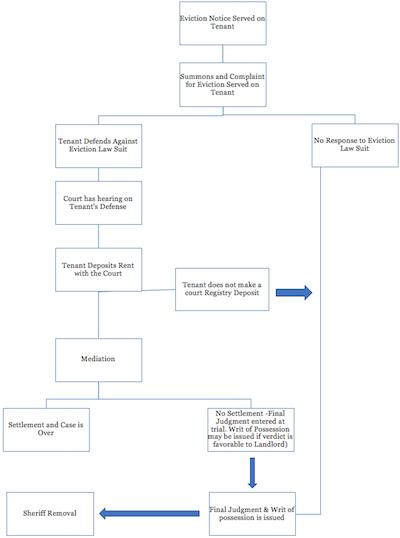Experience.
Residential Landlord Tenant Evictions
The relationship between a landlord and tenant is often a productive one that proves beneficial to both parties. However, when disputes do arise they usually happen suddenly turning the parties into bitter adversaries. Evictions usually follow. There are three main reasons why someone may be seeking to evict a tenant:
- Failure to Pay Rent
- The tenant breaches the terms of release
- The tenant holdovers (or stays past the agreed upon date in the written lease agreement)
Failure to Pay Rent
Florida eviction law falls under Florida Statute Chapter 83. The rules for eviction of a residential tenant involve very specific procedural guidelines that must be followed. Because of these specific guidelines it is advised that if pursuing this path, you should hire a lawyer to make sure all necessary steps are met. Our goal is to make this as simple as possible for you. We are well versed in evictions and we will do whatever we can help you through this process.
One of the biggest rules when it comes to residential evictions for a landlord is that the landlord cannot partake in self-help. This means that you cannot just walk in and say, “you didn’t pay me so I’m kicking you out,” and proceed to remove their property, change the locks or any other type of action.
The first thing in a tenant eviction for failure to pay rent is the drafting of a 3-day notice to pay rent and get it to the tenant either by mail or by placing it on the door of the property. The Florida Statute states, “If the tenant fails to pay rent when due and the default continues for 3 days, excluding Saturday, Sunday, and legal holidays, after delivery of written demand by the landlord for payment of the rent or possession of the premises, the landlord may terminate the rental agreement. Legal holidays for the purpose of this section shall be court-observed holidays only.” § 83.56 (3), Fla. Stat. Ann.
There are very specific requirements for the 3-day notice and it is best if you let an attorney draft it. First the notice must be in writing, second it must demand for the EXACT amount of rent that is due back, a wrong number will make it invalid, and the notice must DEMAND for the rent be paid. After the notice is posted a Complaint and Summons should be drafted and sent to court for the potential trial. Some of the bigger mistakes when it comes to drafting the notice that will get the entire case dismissed include:
- A lease held by husband and wife, but the notice demands only payment from the husband will be considered invalid; or
- If the notice demands an incorrect amount of rent it is defective.
After the notice is posted and the three days pass if the tenant has made no effort then the procedure is very simple. The court will review the Complaint and enter a declaratory judgment and then issues a writ of possession (this means they will just say the case is over and will give you, as the landlord, possession back). If, however the Tenant files a response to the complaint, in anyway, then the court will order a hearing to listen to what defenses the Tenant has. The Tenant MUST put the amount of money they owe in rent into an account with the court for the court to even hear their defenses. The flowchart below follows the procedures for evictions for failure to pay rent:

Non-Compliance With Lease Agreement
A tenant eviction can also occur if the tenant fails to comply with the terms of the lease agreement. If you have a written lease with your tenant and they violate a provision, then you as landlord can evict them. You MUST serve a 7-day notice of lease violation. If they continue to violate the provision after the 7 days has expired, then you can file a complaint for possession and damages. Then the same court proceeding like the above failure to pay rent issue will proceed.
Holdover Tenant
If there is a written lease and the tenant was supposed to move out by a specific date and did not they are considered a holdover tenant. In this case no notice is required to be given to the tenant. You simply have to file a complaint for possession and damages by the NEXT business day.
If you didn’t have a written lease then the rental period is determined by whatever period increments the tenant pays rent for, week-to-week, month-to-month or possibly year-to-year. As landlord you must file a notice of non-renewal and it must be done 7-days prior to the end of a given weekly rental period (in a week-to-week setting) or 15-days prior in a month rental period (in a month-to-month setting).
If any of these scenarios have happened to you and you need help removing your tenant Andrew J. Pascale can help. Please feel free to contact him at (877) 667-1211.




